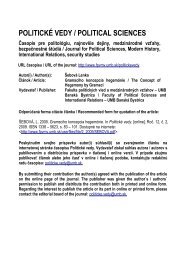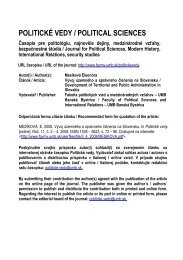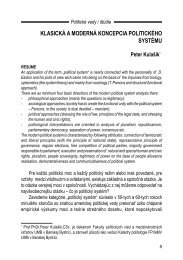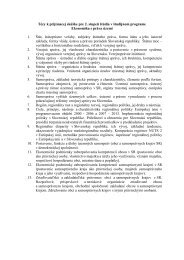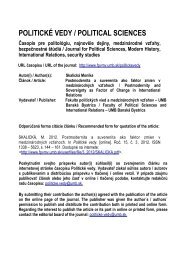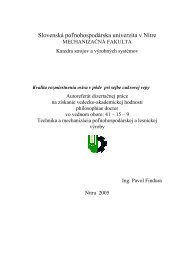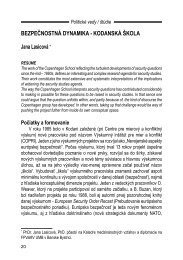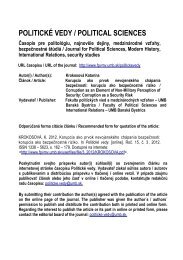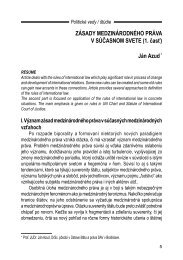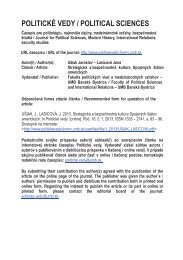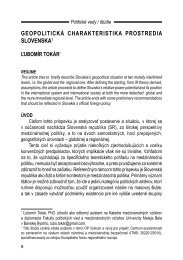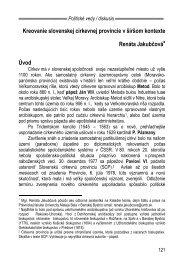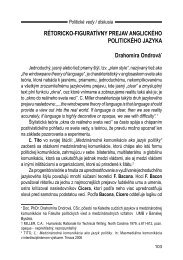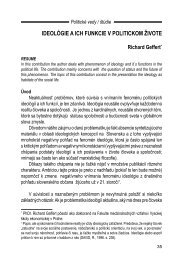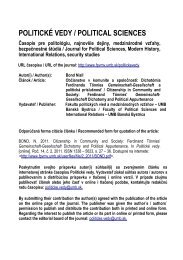MRAVNÃ VÃCHOVA V Å KOLÃCH NA SLOVENSKU A V ZAHRANI ÄÃ
MRAVNÃ VÃCHOVA V Å KOLÃCH NA SLOVENSKU A V ZAHRANI ÄÃ
MRAVNÃ VÃCHOVA V Å KOLÃCH NA SLOVENSKU A V ZAHRANI ÄÃ
You also want an ePaper? Increase the reach of your titles
YUMPU automatically turns print PDFs into web optimized ePapers that Google loves.
TECHNOLOGY AND PROSOCIAL LABORATORY IN<br />
PERSO<strong>NA</strong>L DOMAINS FOR A CULTURE OF PEACE<br />
Robert Roche OLIVAR<br />
Universitat Autònoma de Barcelona, E<br />
Facultat de Psicologia, e-mail: Robert.Roche@uab.es<br />
Psychology is gradually focusing more on studying processes of positive and optimal development for<br />
individuals’ mental health and for maintaining and improving interpersonal and social relationships.<br />
One of the fields in which the headway in this realm may have more prominent social repercussions is<br />
peace.<br />
The concept of peace, as the antonym of war, has generated cognitions related to collective dynamics<br />
that can be beyond not only an individual’s control but also any of his or her possibilities to intervene<br />
and thus reserved solely for people with very high political responsibilities or a great deal of power.<br />
Speaking about a culture of peace brings us closer to the concept, to the possibilities for action, and<br />
thus to a certain degree or responsibility. The culture of peace is a concept taken on, for example, in<br />
school-based education.<br />
Universities, too, as educators, with their experience of exercising universality and neutrality, have<br />
always been institutions that build peace.<br />
Psychology, as the science of behaviour, alongside other disciplines such as sociology and political<br />
science, is highly responsible for observing, describing, explaining, interpreting and thus optimising<br />
those causes that are omnipresent yet perhaps still unknown to other disciplines which until now had<br />
been the only ones to attempt to explain the processes leading to conflict or war.<br />
And there is still much more to explore in the role played by these causes linked to very basic<br />
mechanisms of human behaviour. Assuming that human beings are aggressive or that power<br />
relationships govern relationships amongst human beings and thus that confrontation and violence are<br />
inevitable is too simple for the current state of knowledge.<br />
The variables that make these results more complicated from a perspective that is called cultural<br />
learning are highly varied and interesting. Perhaps it has been this interest, and at times certain<br />
evidence, that has prevented the opposite mechanisms that might play a role not only in inhibiting<br />
violent attitudes and behaviours but the prevention or true optimisation of interpersonal and social<br />
relationships from being studied as avidly.<br />
Education for peace would be one of the most effective, safe ways of making headway in this<br />
direction, with peace regarded not merely as the absence of war or violence, rather as a type of<br />
awareness, a sensitivity, actions that weave a social fabric of relationships based on positive<br />
reciprocity aimed at fraternity and unity, which beginning in interpersonal relationships will clearly<br />
be involved in transforming social, civic and political structures, with special focus on disadvantaged<br />
collectives.<br />
Along these lines, we have been working to explore the potential of prosocial attitudes and behaviours<br />
since 1982 (Roche, 1995, 1998, 1999).<br />
After working to develop systematic programmes for this field of learning in all levels of education,<br />
both in Spain and in Slovakia (Roche, 1992. Lencz, 1994), Italy (1997, 1991) and Argentina (1998),<br />
and within the Prosocial Optimisation subject in our faculty, for six years we have steadfastly<br />
undertaken a project entailing practical experiences which enable students in the second cycle of their<br />
degree programmes to gain more in-depth knowledge of prosocial behaviour that involves them<br />
personally, as a way to enable it to be critically examined in both theory and practice.<br />
162



